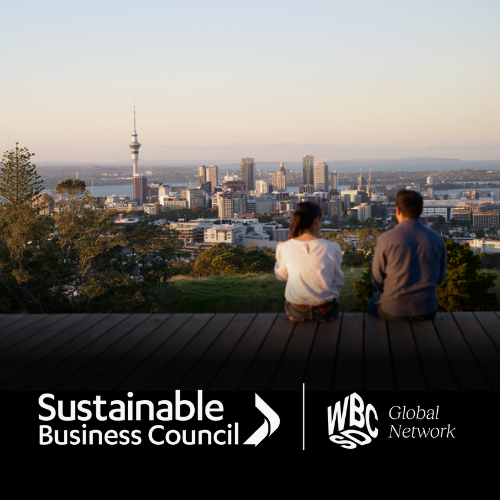What do the Sustainable Development Goals mean for business?
There is a growing awareness among New Zealanders about the UN Sustainable Development Goals (SDGs) – as Colmar Brunton shows us in their latest Better Futures report – but also significant business leadership. Within two years of the SDGs being launched, over 25% of SBC members have reported how they have aligned their company values, targets and strategies with the SDGs. SBC has done so too, in our Annual Snapshot.
There is a growing awareness among New Zealanders about the UN Sustainable Development Goals (SDGs) – as Colmar Brunton shows us in their latest Better Futures report (PDF) – but also significant business leadership. Within two years of the SDGs being launched, over 25% of SBC members have reported how they have aligned their company values, targets and strategies with the SDGs. SBC has done so too, in our Annual Snapshot.
The SDGs set out a clear vision for a sustainable future and call for urgent action to achieve goals such as tackling climate change, reducing inequality, and eliminating poverty by 2030.
But members tell us navigating the 17 goals and 169 targets and making them meaningful and relevant to staff, customers or suppliers is not easy. Increasingly, SBC members want to contribute to national priorities, as well as measuring and reporting their impact, when it may not be clear what those priorities are.
So, on Tuesday, SBC and Beca hosted a networking event to share the latest developments and approaches for embedding the SDGs into business – by moving beyond mapping.
Phillip Taula, Divisional Manager, UN, Human Rights and Commonwealth, outlined the role of MFAT and other government agencies in implementing the SDGs through domestic and international policy. While Government’s 2030 agenda has not been framed around the SDGs so far, the Government is committed to embedding the SDGs into everything it does. The Living Standards Framework, Indicators Aotearoa and a wellbeing budget are key instruments by which they are delivering on that commitment.
MFAT will present its first progress report on the SDGs to the UN in May 2019. Phillip invited businesses to engage with MFAT to help tell the New Zealand story and showcase good practice in particular areas. We will be working with MFAT on how this can be done.
The SDGs provide an aspirational framework to translate global needs and ambitions into business solutions, which are estimated to be worth $12 trillion globally (PDF). Lisa Martin (Sanford), Kate Beddoe (Vector) and Caroline Thalund (Christchurch International Airport) showed us how aligning business strategy and decision-making with the SDGs is already enabling their organisations to better manage risk, anticipate consumer demand, grow their business and strengthen supply chains while moving towards a better future for New Zealand.
Lisa Martin, GM Sustainability, talked about how Sanford have focused on eight key SDGs with the biggest potential impact through partnership and collaborations, to achieve balance across the environment, people and economy.
Integrating the SDGs into their materiality assessment process and stakeholder engagement processes is a key step to embedding the SDGs into their integrated thinking and reporting. By using the SDGs to gain a deeper understanding of stakeholder needs and expectations – including youth, the SDGs help inform strategy development, day-to-day decision-making and reviewing their targets, enabling Sanford to ‘push the boundaries’ on its aspirations and integrated thinking.
Kate Beddoe, Chief Risk Officer, gave an update on how Vector’s thinking and practice has developed over the last 12 months, from the initial prioritisation to implementation. Initiatives such as Vector’s Urban Forest highlight the importance of partnerships and collaborations. Vector are using the SDGs as a way to identify business opportunities arising from global issues such as climate change and reducing inequality, to drive action and bringing the SDGs to life within the organisation and making them real for staff; and to enable Vector to go beyond the normal expectations of incremental change.
Kate also talked about how Vector has begun to implement the SDGs (notably SDG#10 Reducing Inequality) through procurement. As the first large corporate to be an accredited living wage employer, Vector is now extending that commitment through its supply chain. The next steps include developing detailed short-term targets to support long-term aspirations to drive action by business units.
Finally, Caroline Thalund, Sustainability Champion, talked about how Christchurch International Airport has moved from a ‘top-down’ mapping and alignment process, to embark on a creative ‘bottom up’ approach to build an organisational culture on based on sustainability.
A comprehensive engagement programme across the organisation started with individual business units through to the Board. This approach has improved awareness, understanding, buy-in and ownership of their sustainability strategy, and its links to the global goals.
With just over 4000 days to deliver on the SDG agenda, the SDGs provide us with an ambitious vision and framework for a better future and better business. While action and leadership abound, there is no ‘one size fits all’ approach, and there is lots to do.
Late last year SBC worked with Stuff on a 19-part series that ran in the Sunday Star-Times. Each goal was a springboard to explore a sustainable business trend or project in New Zealand. Dozens of SBC member initiatives were highlighted as a result.
Is your business using the SDGs framework to achieve your sustainability goals? We would welcome guest blogs about your experience.
Useful resources
Integrating the SDGs into Corporate Reporting: A Practical Guide (GRI and UNGC)
How to report on the SDGs (KPMG)
CEO Guide to the SDGs (WBCSD)
Business Reporting on the SDGs: An Analysis of the Goals and Targets (GRI and UNGC) (PDF)
In Focus: Addressing Investor Needs in Business Reporting on the SDGs (GRI and UNGC)
SDGs, integrated thinking and the integrated report (IIRC, ICAS)
SDG leadership series (Global Scan)
About the SDGs and business
Recent development for business from the UN General Assembly (PDF)
SDG Business Hub (WBCSD)
Contact: Robert Perry, Sustainable Leadership Manager
Phone:
Email:

